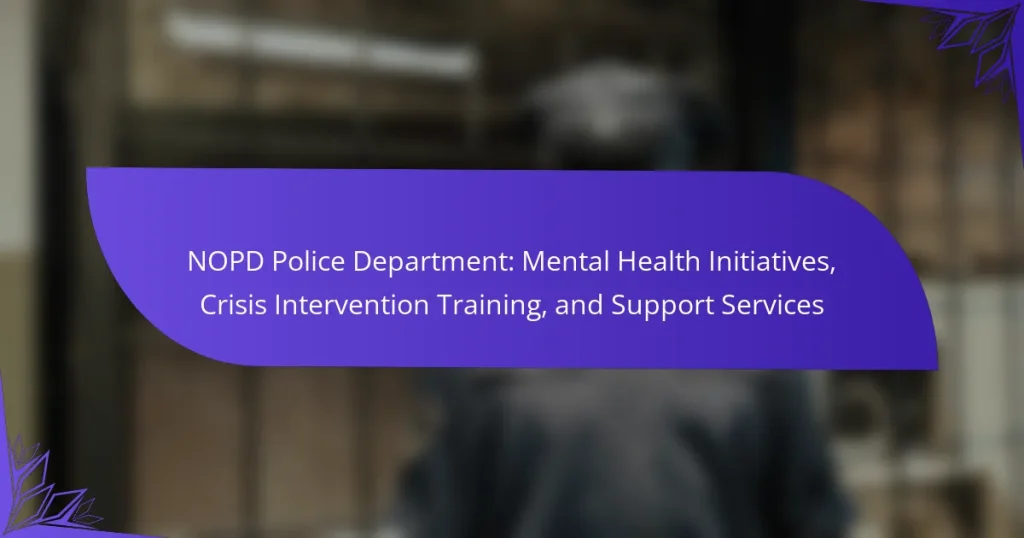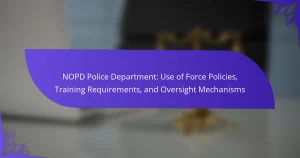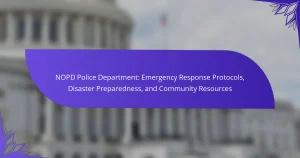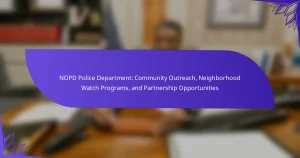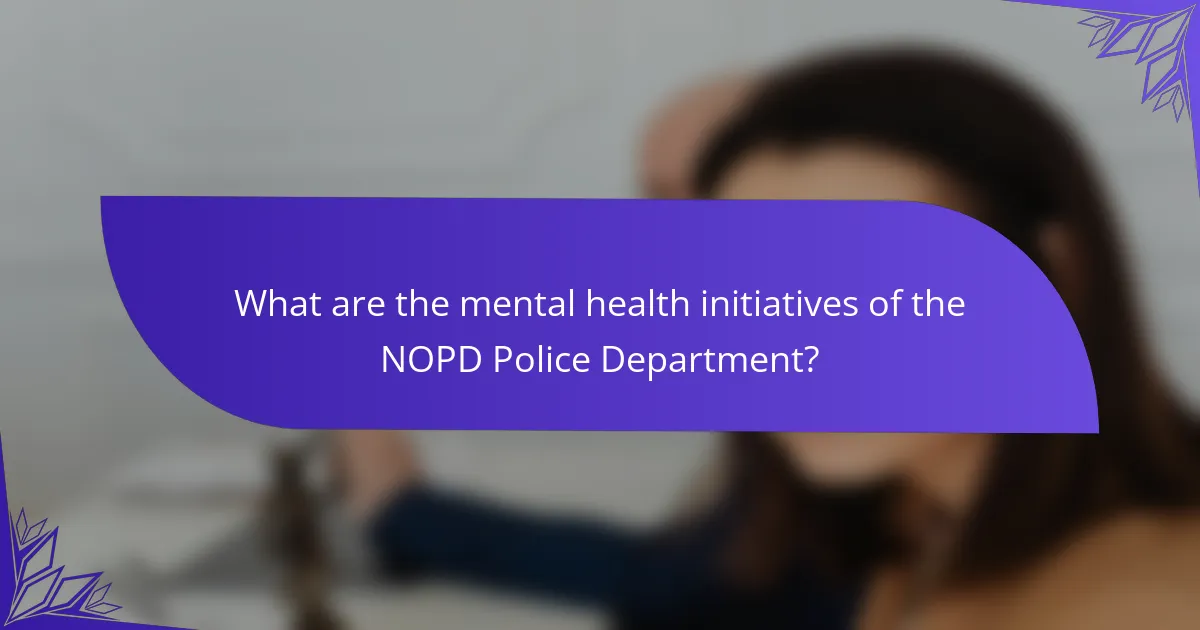
What are the mental health initiatives of the NOPD Police Department?
The NOPD Police Department implements several mental health initiatives. These initiatives include Crisis Intervention Training (CIT) for officers. CIT equips officers with skills to handle mental health crises effectively. The training emphasizes de-escalation techniques and understanding mental health disorders. Additionally, the NOPD collaborates with mental health professionals. This partnership enhances the support provided during incidents involving mental health issues. The department also offers resources for officers’ mental well-being. These resources include counseling and peer support programs. Overall, these initiatives aim to improve interactions between the police and individuals experiencing mental health crises.
How do these initiatives address community needs?
These initiatives address community needs by providing specialized support for individuals experiencing mental health crises. The NOPD’s mental health initiatives include training officers in crisis intervention techniques. This training equips officers with skills to de-escalate situations involving mental health issues. Consequently, it reduces the likelihood of confrontations and promotes safer interactions. Moreover, the support services connect individuals to mental health resources. This connection ensures ongoing care and support within the community. Research shows that trained officers can significantly improve outcomes for individuals in crisis. This approach fosters trust between the police and the community, enhancing overall public safety.
What specific programs are included in these initiatives?
The specific programs included in the NOPD’s mental health initiatives are Crisis Intervention Training (CIT), the Mental Health Unit, and the Behavioral Health Response Team. CIT trains officers to recognize and respond to mental health crises effectively. The Mental Health Unit provides specialized support and resources for individuals with mental health issues. The Behavioral Health Response Team collaborates with mental health professionals to assist during crises. These programs aim to improve interactions between law enforcement and individuals experiencing mental health challenges.
How are these programs evaluated for effectiveness?
Programs are evaluated for effectiveness through a combination of quantitative and qualitative metrics. Quantitative metrics may include the reduction in crisis incidents involving individuals with mental health issues. Qualitative metrics often involve feedback from participants and stakeholders. Evaluations may also assess training completion rates among officers. Data collection methods can include surveys, interviews, and incident reports. Additionally, independent assessments may be conducted by external organizations. The effectiveness of these programs is often benchmarked against established best practices in mental health crisis intervention. Studies have shown that successful programs can lead to improved community relations and better outcomes for individuals in crisis.
Why is mental health a priority for the NOPD Police Department?
Mental health is a priority for the NOPD Police Department due to its impact on officer wellbeing and community relations. The department recognizes that mental health issues can affect decision-making and performance. By prioritizing mental health, the NOPD aims to reduce incidents of crisis and improve responses to mental health emergencies. Furthermore, studies show that officers with better mental health are more effective in their roles. The NOPD implements initiatives like Crisis Intervention Training to equip officers with skills to handle mental health situations. This training fosters understanding and empathy, leading to better community interactions. Ultimately, prioritizing mental health supports both officers and the communities they serve.
What statistics highlight the importance of mental health in policing?
Mental health is critical in policing due to its impact on officer well-being and community safety. Studies show that approximately 30% of police officers experience symptoms of depression. Additionally, around 20% report experiencing post-traumatic stress disorder (PTSD). Research indicates that officers with mental health issues are more prone to engage in risky behaviors. A survey found that 40% of officers believe their mental health affects their job performance. Furthermore, departments with mental health support see a reduction in officer-related incidents. Evidence suggests that effective mental health training can improve decision-making in high-stress situations. These statistics underscore the necessity of mental health initiatives in law enforcement.
How does mental health impact officer performance and community relations?
Mental health significantly impacts officer performance and community relations. Officers experiencing mental health issues may show decreased job performance. This can manifest as impaired decision-making and increased stress levels. A study by the International Association of Chiefs of Police found that officers with untreated mental health conditions are more likely to engage in excessive force.
Furthermore, mental health challenges can hinder effective communication with the community. Officers struggling with mental health may lack the emotional resilience required for community engagement. This can lead to strained relationships and reduced trust between law enforcement and community members.
In contrast, departments that prioritize mental health support report improved officer morale and better community interactions. For example, the NOPD’s mental health initiatives aim to provide resources for officers, enhancing their ability to serve effectively. Overall, mental health is crucial for maintaining both officer performance and positive community relations.
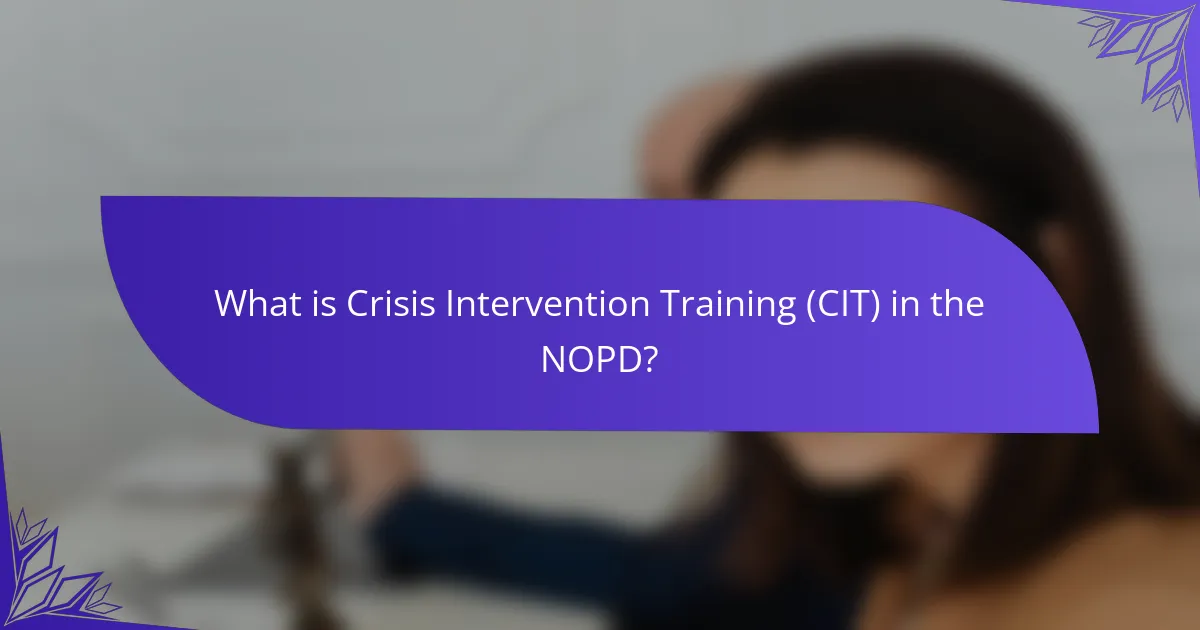
What is Crisis Intervention Training (CIT) in the NOPD?
Crisis Intervention Training (CIT) in the NOPD is a specialized program designed to train police officers in handling incidents involving individuals experiencing mental health crises. The training equips officers with skills to de-escalate potentially volatile situations. CIT emphasizes communication, empathy, and understanding mental health issues. Officers learn to recognize signs of mental illness and how to respond appropriately. The program promotes collaboration with mental health professionals. CIT aims to reduce arrests and hospitalizations related to mental health crises. It also enhances community trust in law enforcement. The NOPD has implemented CIT to improve outcomes for individuals in crisis.
How does CIT prepare officers to handle mental health crises?
Crisis Intervention Training (CIT) prepares officers to handle mental health crises through specialized education and practical exercises. Officers receive training on recognizing mental health issues and understanding the needs of individuals in crisis. The curriculum includes crisis de-escalation techniques, which help officers manage volatile situations calmly. Officers also learn about local mental health resources to provide appropriate referrals. Role-playing scenarios are used to simulate real-life situations, enhancing officers’ response skills. CIT emphasizes communication skills to build rapport with individuals in distress. Studies show that CIT-trained officers are more effective in resolving mental health crises without resorting to force. This training ultimately aims to improve outcomes for individuals experiencing mental health emergencies.
What are the key components of the CIT curriculum?
The key components of the CIT curriculum include mental health education, crisis intervention strategies, and community resources. Mental health education covers various mental illnesses and their symptoms. Crisis intervention strategies teach de-escalation techniques and effective communication. Community resources provide information on local mental health services and support systems. Role-playing scenarios are also included to simulate real-life situations. Training emphasizes collaboration with mental health professionals. Overall, the curriculum aims to improve police response to mental health crises. These components are essential for enhancing officer preparedness and community safety.
How is the effectiveness of CIT measured?
The effectiveness of Crisis Intervention Training (CIT) is measured through various metrics. These include reductions in use-of-force incidents during mental health crises. Additionally, evaluation often involves analyzing arrest rates and hospitalizations for individuals experiencing mental health issues. Surveys and feedback from officers and community members provide qualitative data on CIT’s impact. Studies indicate that departments implementing CIT report improved interactions with individuals in crisis. For example, research by the University of Memphis found a significant decrease in injuries to both officers and individuals during CIT encounters. Overall, these measurement methods help assess CIT’s success in enhancing police responses to mental health crises.
What role does CIT play in community safety?
Crisis Intervention Training (CIT) enhances community safety by equipping law enforcement with skills to handle mental health crises. CIT-trained officers can de-escalate situations effectively, reducing the need for force. This approach fosters better interactions between police and individuals experiencing mental health issues. Research indicates that CIT programs lead to fewer arrests and hospitalizations, promoting community trust. Studies show that communities with CIT initiatives report improved safety outcomes. Overall, CIT plays a crucial role in creating safer environments for all residents.
How does CIT improve interactions between officers and individuals in crisis?
Crisis Intervention Training (CIT) improves interactions between officers and individuals in crisis by equipping officers with skills to de-escalate situations. Officers learn to recognize mental health issues and respond appropriately. This training emphasizes communication techniques and empathy. CIT fosters understanding of mental health challenges. It encourages officers to utilize resources effectively. Studies show that CIT reduces arrests and injuries during crisis encounters. For instance, a study from the University of Memphis found a 23% reduction in use-of-force incidents. Overall, CIT enhances officer confidence and community trust.
What feedback have community members provided about CIT?
Community members have provided positive feedback about Crisis Intervention Training (CIT). They report that CIT enhances officers’ understanding of mental health issues. Participants note improved interactions between police and individuals experiencing crises. Many community members appreciate the focus on de-escalation techniques. Feedback indicates that CIT fosters trust within the community. Some members highlight the training’s impact on reducing stigma surrounding mental health. Additionally, there are mentions of better outcomes during mental health-related calls. Overall, the feedback suggests CIT is beneficial for both officers and the community.
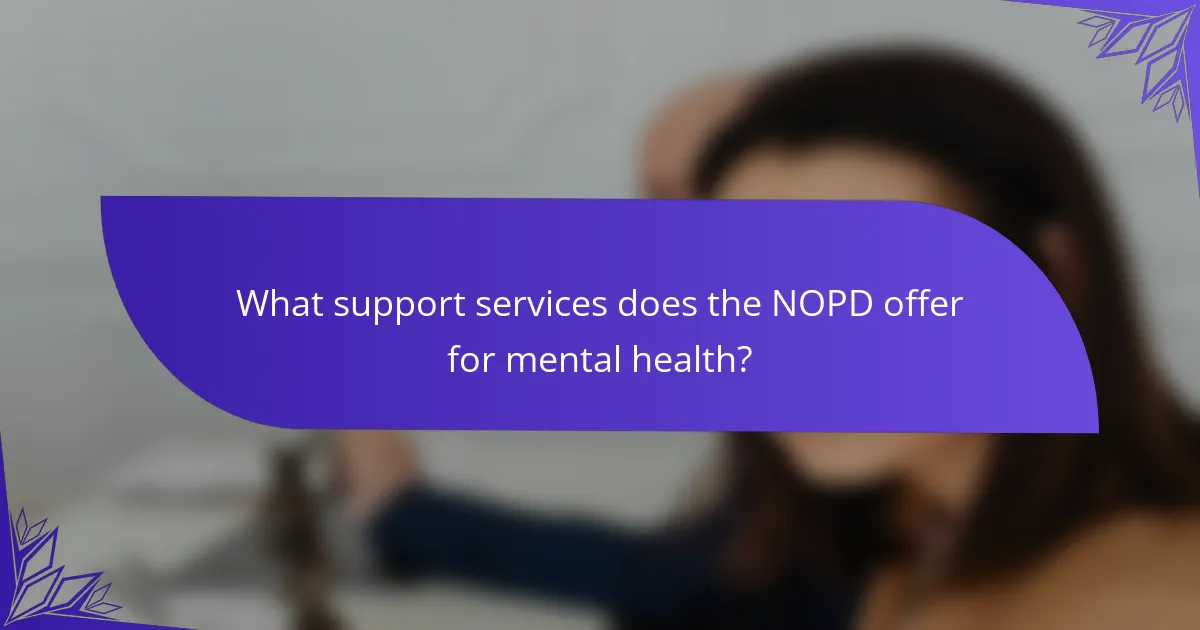
What support services does the NOPD offer for mental health?
The NOPD offers several support services for mental health. These include crisis intervention training for officers. This training equips officers to handle mental health crises effectively. The NOPD also collaborates with mental health professionals. They provide resources and referrals for individuals in need. Additionally, the department has a dedicated mental health unit. This unit focuses on outreach and support for those experiencing mental health issues. The services aim to connect individuals with appropriate care and resources. This approach enhances community safety and well-being.
What types of support services are available to officers?
Support services available to officers include mental health resources, peer support programs, and counseling services. Mental health resources provide access to trained professionals for emotional and psychological support. Peer support programs connect officers with fellow officers who have experienced similar challenges. Counseling services offer confidential sessions to address personal and professional issues. These services aim to promote officer well-being and resilience. The NOPD emphasizes the importance of mental health in maintaining effective policing. Research shows that such support can reduce stress and improve job performance among officers.
How do these services contribute to officer well-being?
Mental health initiatives, crisis intervention training, and support services contribute significantly to officer well-being. These services provide essential resources for managing stress and trauma. They enhance emotional resilience through training and support programs. Officers receive tools to cope with job-related challenges. Access to mental health resources reduces stigma surrounding psychological support. Research indicates that such initiatives improve job satisfaction and reduce burnout. Improved officer well-being leads to better community interactions and public safety. Overall, these services create a healthier work environment for law enforcement personnel.
What resources are provided for community members seeking help?
The NOPD Police Department provides various resources for community members seeking help. These include mental health crisis intervention services. Trained officers respond to mental health emergencies. They collaborate with mental health professionals for effective assistance. Additionally, the department offers access to local mental health facilities. Community outreach programs are available to educate the public. Information on available services is disseminated through community events. Support hotlines are also established to provide immediate assistance. These resources aim to enhance community well-being and safety.
How does the NOPD collaborate with mental health organizations?
The NOPD collaborates with mental health organizations through partnerships and training initiatives. They work closely with local mental health providers to ensure proper support for individuals in crisis. The department engages in Crisis Intervention Training (CIT) to equip officers with skills to handle mental health situations effectively. This training includes collaboration with mental health professionals who provide insights on best practices. Additionally, the NOPD participates in community outreach programs to connect individuals with mental health resources. These efforts aim to reduce stigma and promote understanding between law enforcement and mental health services. The collaboration enhances the overall response to mental health crises in the community.
What partnerships exist between NOPD and local mental health agencies?
NOPD collaborates with several local mental health agencies to enhance community safety and support. Key partnerships include collaborations with the New Orleans Health Department and the Louisiana Department of Health. These partnerships focus on crisis intervention and mental health training for officers. They aim to improve response to mental health crises. This initiative helps in connecting individuals with appropriate mental health services. Additionally, NOPD works with local nonprofits to provide resources and support. These partnerships are part of a broader strategy to address mental health issues within the community.
How do these collaborations enhance service delivery?
Collaborations enhance service delivery by integrating diverse resources and expertise. These partnerships allow for a more comprehensive approach to mental health crises. They facilitate training that equips officers with specialized skills. This training improves interactions with individuals experiencing mental health issues. Data shows that trained officers can de-escalate situations more effectively. Collaborations with mental health professionals provide ongoing support and guidance. This ensures that individuals receive appropriate care and resources. Ultimately, these efforts lead to better outcomes for the community and reduce the burden on emergency services.
What best practices can be implemented to improve mental health initiatives?
Implementing best practices to improve mental health initiatives includes enhancing training for personnel. Training should focus on crisis intervention techniques. Research indicates that comprehensive training reduces negative outcomes during mental health crises. Collaboration with mental health professionals is essential for effective intervention. Establishing partnerships can provide valuable resources and expertise. Regular assessment of mental health programs ensures they meet community needs. Feedback from participants can guide improvements. Additionally, increasing public awareness about mental health services encourages community engagement. Studies show that awareness campaigns can significantly reduce stigma. These practices collectively strengthen mental health initiatives and promote better outcomes.
The NOPD Police Department focuses on mental health initiatives, including Crisis Intervention Training (CIT) for officers, aimed at improving interactions with individuals experiencing mental health crises. Key programs such as the Mental Health Unit and Behavioral Health Response Team enhance support during these incidents. The article evaluates the effectiveness of these initiatives through quantitative and qualitative metrics, highlighting their role in fostering community trust and officer well-being. Additionally, it explores the importance of mental health in policing, the support services available for officers, and the collaborations with local mental health organizations to ensure comprehensive care and resources for the community.
